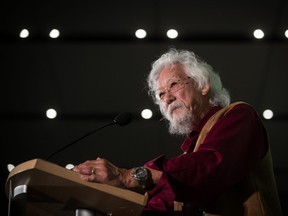“Humans now have the mindset that they are in control of everything and can dispose of nature as they wish, but we know how destructive this way of thinking has become.”

Politicians who believe in climate change and want to protect the environment are unable to do so because they are trapped in a political system that does not value nature.
This is among the issues raised by environmentalist David Suzuki, who was in Montreal this week.
The exhibition Nature Vive, an immersive experience currently presented at the Palais des congrès in Montreal, concludes with a video in which the environmentalist discusses the state of the planet with his daughter and grandson.
The grandson points out if nature is in crisis, it seems that “the world’s leaders have forgotten what it means to be human.”
The environmental activist responds there is, however, “a glimmer of hope and change is happening,” as “we are seeing more and more commitments to protect nature.”
In an interview, La Presse Canadienne asked Suzuki if he feared the potential elections of Donald Trump in the U.S. and Pierre Poilievre in Canada would jeopardize many commitments made in recent years to protect biodiversity and combat climate change.
“Frankly, Poilievre will come in, and yes, he will destroy all that,” Suzuki said, seated in a café at the Palais des congrès.
While the 88-year-old does not hold the conservative politician in high regard, he is equally dissatisfied — putting it mildly — with Justin Trudeau’s performance.
He recounted calling the prime minister in 2015 to congratulate him on signing the Paris Agreement and setting ambitious targets for Canada.
“I celebrated and thought, finally, we have a prime minister who understands what’s happening, but two years later, he bought the Trans Mountain pipeline.”
Suzuki shared he emailed Trudeau to explain “his own children will pay the price for this decision” and asked him to reflect on why he wanted to be prime minister.
“Do you know what he replied? Nothing. He hasn’t responded to my emails since,” Suzuki said.
“Trudeau understands climate change, but politics holds him hostage,” he added.
At this point in the interview with La Presse Canadienne, the environmentalist’s tone escalated — he even let slip a few expletives.
Regardless of who is in power, our political system does not allow for environmental protection, Suzuki said.
“The job of the minister of fisheries and oceans is not to protect fish, but rather the people who want to use the fish or the oceans. The minister of natural resources does not protect forests, but the people who exploit them.
“Humans now have the mindset that they are in control of everything and can dispose of nature as they wish, but we know how destructive this way of thinking has become. Lions are disappearing? We’ll say: ‘Oh my God, we need to save them.’ Humpback whales are disappearing? Then we think we should do something. But we aren’t addressing the root of the problem,” he said.
“Since the beginning of my life, half of the planet’s species have disappeared, and a million others are now on the brink of extinction,” Suzuki said.
“We are part of this nature, so when we destroy it, we destroy ourselves.”
To illustrate how humans have lost touch with nature and its value, Suzuki referred to a passage from Mark Carney’s book, Value(s) — Building a Better World for All.
“Jeff Bezos’s Amazon is valued at over $100 billion by the economy. But the Amazon, the largest ecosystem on the planet, has no economic value until someone exploits a mining site, harvests its trees, or grows corn there.”
This is further proof “that this system is broken,” he stated, adding “we are trapped by an economic, legal, and political system that does not take nature into account” and its real, invaluable worth.
Suzuki visited Montreal primarily to see the immersive exhibition Nature Vive, which he helped create with his family and was experiencing for the first time.
The exhibition uses immersive digital arts and aims to “inspire visitors of all ages to take positive action regarding major biodiversity issues.”
Upon exiting the exhibition, the environmentalist described the experience as “very emotional” and recommended it to “everyone, especially those with children and grandchildren.”
However, he wished the overall message of the work was bolder.
“Humans have been around for 200,000 years, which is very recent.”
But “recently, we have moved away from nature,” and “very suddenly, we’ve become this incredible predator because we now have technologies that allow us to do things no animal has ever done.”
He added humans “have taken control of the planet, we’ve become very destructive” and “I wish this reality had been conveyed” in this immersive experience.
Despite his anger and indignation at the destructive behaviours of humans and their leaders, Suzuki said he remains hopeful.
Humans, he explained, have shifted from being an animal in symbiosis with nature to a destructive one in a very short time, around 200 years.
The opposite, he believes, can also happen.
That is, transitioning from a destructive lifestyle to a more harmonious one in a very short time.